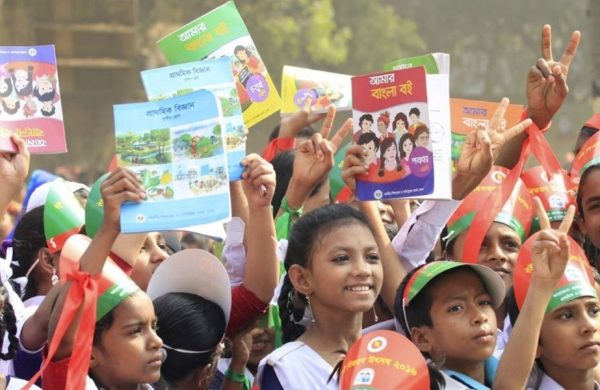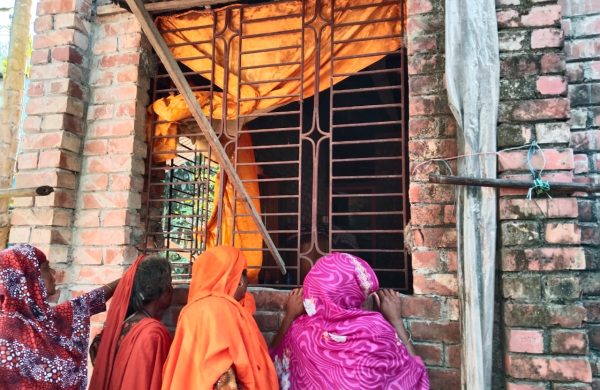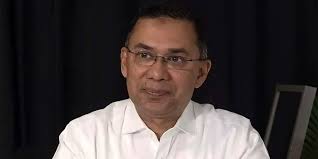As Bangladesh turns the page on education, here’s what to expect in new school textbooks
- Update Time : Sunday, November 3, 2024

TDS Desk
The overarching implications of the student-led mass movement that toppled the Sheikh Hasina regime are coming to bear on the education sector, where changes to textbooks are afoot. The process of removing Hasina’s messages and adding student-drawn graffiti from the July protests is nearly complete.
These changes are part of the interim government’s plan to revise textbooks at all levels as part of ongoing curriculum overhaul.
Accordingly, the message from the deposed prime minister, who fled to India during the student protests in August, will be omitted from the back covers of most textbooks.
Instead, graffiti created by students during the July-August movement will be included.
Prof AKM Reazul Hassan, chairman of the National Curriculum and Textbook Board (NCTB), which oversees the creation and printing of textbooks, hinted at the updates.
While current textbooks focus heavily on Bangabandhu Sheikh Mujibur Rahman’s role in the Liberation War, the new editions will highlight contributions from other key figures like Maulana Abdul Hamid Khan Bhashani, Tajuddin Ahmad, Syed Nazrul Islam, Gen Ataul Gani Osmani, and Maj Ziaur Rahman.
Plans are also underway to include the ‘heroic stories’ of Abu Sayed, Mir Mahfuzur Rahman Mugdho, and others who lost their lives during the July-August uprising in the upcoming academic year’s textbooks.
Reports suggest that the writings of some regular authors, especially those linked to the previous administration, will be excluded from various textbooks.
The NCTB is also taking care to ensure that the content of the books does not offend any group or community.
On Aug 5, Hasina fled to India in the face of widespread protests. Three days later, an interim government led by Nobel laureate Muhammad Yunus was formed.
Prof Wahiduddin Mahmud, who took on the role of education advisor, confirmed that the interim government would move away from the ‘controversial’ new curriculum developed by the Awami League administration, as it was “not feasible for implementation”.
“We will revert to the old curriculum, but in a way that does not disrupt students’ studies. This curriculum appears to be unfeasible for implementation. We are exploring ways to transition back to the previous curriculum.”
The advisor’s statement has sparked fresh concerns and questions among students and parents about potential changes and revisions to the curriculum.
For over a decade, the education system has undergone numerous changes and trials.
The Awami League government introduced the ‘Curriculum-2022’, which brought sweeping changes to the education system up to the secondary level.
In 2023, the new curriculum was implemented for grades one, six, and seven, with grades two, three, eight, and nine following suit this year.
The new curriculum featured several changes, such as removing exams up to grade three, eliminating public exams before secondary school, and abolishing the division of students into streams (science, humanities, and business studies) for grades nine and 10.
To ease the pressure on students, a continuous assessment system was introduced throughout the academic year, with comprehensive evaluations at the end of the year. Some subjects relied entirely on continuous assessment.
However, after the fall of the Awami League government, plans have been announced to revamp the secondary education system.
The interim government said that science, humanities, and business studies streams will be reinstated in secondary education, with the evaluation system reverting to the format used in the National Curriculum-2012 from over a decade ago.
On Sept 1, after the education ministry announced that the current curriculum was not practical for implementation nine months into the academic year, discussions began about what changes would be made to next year’s textbooks.
In response, NCTB chief Reazul Hassan said that next year’s textbooks would be printed based on the National Curriculum of 2012, which was introduced over a decade ago.
He noted that efforts were underway to update and revise the textbooks according to the 2012 curriculum, in line with the education ministry’s directive. “The new textbooks will fairly represent the contributions of all key figures,” he said.
When asked about specific changes, Hassan explained, “The current textbooks heavily emphasise the role of Sheikh Mujibur Rahman in the Liberation War. The revised textbooks will also highlight the contributions of Maulana Abdul Hamid Khan Bhashani, Tajuddin Ahmad, Syed Nazrul Islam, Gen Ataul Gani Osmani, and Maj Ziaur Rahman.”
“Ziaur Rahman’s multiple proclamations of independence will also be included,” he added.
Fatihul Quadir, who is heading the NCTB’s education and editing wing, previously informed journalists that an excerpt from ‘The Unfinished Memoirs’ by Sheikh Mujibur Rahman, which has been part of the Bangla textbook for grades 11 and 12 for years, will be removed.
Currently, the back covers of textbooks feature various quotes from Hasina, referring to her as the “Honourable Prime Minister”.
The back cover of the sixth-grade health protection textbook features the quote: “Build yourselves as capable citizens to create the poverty and illiteracy-free Golden Bangladesh of Bangabandhu’s dream. – Honourable Prime Minister Sheikh Hasina.”
Similarly, the back covers of the seventh-grade history and social science book and the ninth-grade mathematics book state: “Gain the skills needed to build a prosperous Bangladesh. – Honourable Prime Minister Sheikh Hasina.”
Hassan revealed that these messages from Hasina will be discarded from next year’s textbooks. He explained, “These were irrelevant. Instead, some back covers will include graffiti drawn by students during the July-August uprising.”
He also mentioned ongoing discussions about incorporating the heroic stories of Abu Sayed and Mir Mughdo, martyrs of the July revolution. “No decision has been made yet. Once finalised, we will specify which stories will be included,” he added.
Earlier this year, a story titled ‘Sharifa’s Story’ in the seventh-grade history and social science book drew significant debate and criticism.
Hassan assured that next year’s textbooks would be carefully reviewed to avoid including any content that could offend any group or community.
Due to time constraints, significant changes to the textbooks may not be feasible, according to Quadir.
Following Education Advisor Wahiduddin Mahmud’s instructions, a panel of authors and editors was formed in mid-September to review and revise the books, he said.
“We don’t have enough time for extensive changes. If we attempt major revisions, the books won’t be ready for distribution by Jan 1.”
In response to questions about the changes, he stated, “We will remove misleading information, historical distortions, excessive praise of individuals, false content, and instances where certain figures were excluded from the textbooks. However, no one will be entirely omitted or ignored.”
He also noted that revisions are being made to the textbooks prepared for the 2024 academic year.
“Given the limited time, this is our only option,” he added.

















